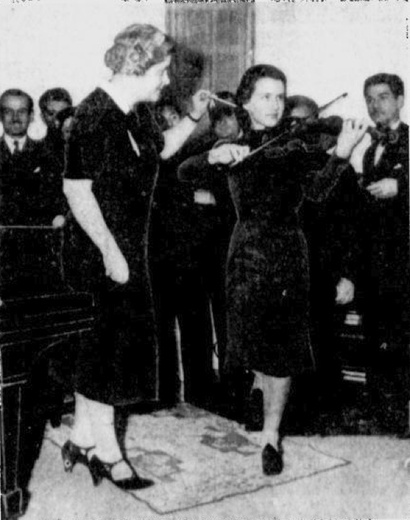
“There was an atmosphere of cheerful banter in the studio where 20 students who have individual lessons assembled informally. It looked like a cross between a music lesson and a class in psychology. Several players were getting a practical lesson in poise through gymnastics. One girl played while standing on one leg, and Miss Stillings held a pencil near her cheek to correct improper swaying [see picture below]. Another student practiced while doing bending movements, to improve his timing and rhythm. A pupil who seemed to have reached an impasse in his playing was instructed cheerfully to forget it for awhile, and go for a walk in the country. Another group was doing an exercise to train their eyes to move more quickly while reading music. From a book they read aloud the first letter of each word in a passage.”
Stillings’ students often fell into the category of professionals wanting a short “refresher” course. From the same article comes her philosophy of helping advanced players:
“When an artist, musician, or writer of ability fails to progress, the problem, Miss Stillings believes, is almost always some mental hazard. She never really studied psychology, but evolved her own teaching method which is closely in line with it from a practical basis. She loves to find and defeat a problem, loves working with another personality. ‘It’s like a crossword puzzle,’ she said.”
In addition to her work at Rutgers and her own studio, Stillings also taught at the Lighthouse School for the Blind and the Ely School in Greenwich, Connecticut. Her obituary in the New York Times also states that she gave refresher courses for professionals at the American Theater Wing, and taught summer master classes in Argentina and Mexico. Her travels are documented in an article typical of ones about professional women in the early and mid 20th century, which appeared in the Feb. 18, 1940 Spokesman Review:
“Food Flash-- New Recipes for Fruit
Kemp Stillings found them in South America and you’ll like them
Because she is internationally recognized among musicians as a foremost authority in the world today on stringed-instrument instruction; because she made a glorious success of a substitute career after the threat of blindness spoiled her opportunity as a very great master-violinist; because she enjoys the good things of life and has a hobby for food and a fine collection of recipes. Kemp Stillings is welcomed to this page.
Much of Kemp’s life has been spent in Europe where she gained an extensive knowledge of food as well as music. She was there as a student, going to class with Heifetz and Elman, and studying under Leopold Auer and Joachim, that great artisit and and intimate friend of Brahms and Schumann. Then after a number of years spent in fighting the mishap to her eyes, she returned summer after summer to conduct master classes in the important cities of Europe, and even went to South America, where women are usually regarded skeptically in any field of endeavor, except being beautiful.
At home also Kemp is an extremely busy woman. For the past fifteen years she has had a job as professor of music at Rutgers University. And in New York City she conducts a private class for more then eighty accomplished musicians. Yet Kemp finds time to experiment with recipes. Her most recent interest is in some recipes she acquired last summer in South America. ‘The cooking there is very fine,’ she says, ‘and they do especially interesting things with fruit. They use it in ways that do not usually occur to us in the United States that are very delicious, especially oranges and bananas.’”
(Anyone wishing the recipes, which include boiled bananas as a vegetable, just email me!)
Next installment: Stillings’ publications!
 RSS Feed
RSS Feed